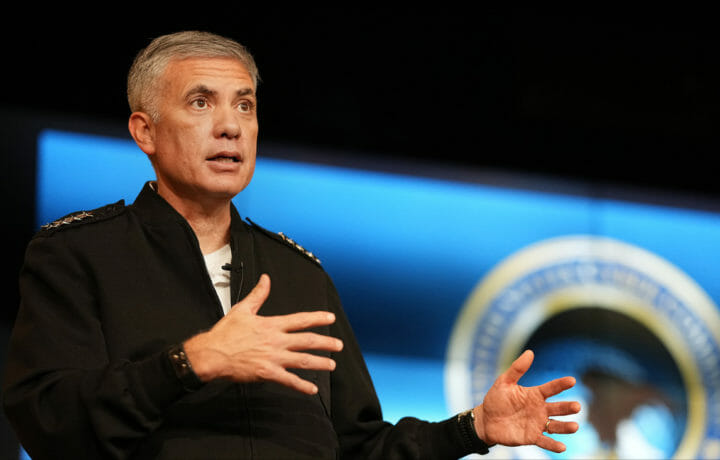One downside of the “Information Age” is that there are now threats that the Founding Fathers could have never envisioned. In addition to fearing a foreign invader or insurrection, there is the concern that misinformation – or worse disinformation – could undermine our democracy by disrupting our election system. This concern has only increased as Americans have expressed concern of our election integrity.
Now with slightly more than two months until the 2022 midterms, the DoD has reaffirmed that it is fully engaged to defending the U.S. electoral system from interference and foreign influence alongside interagency partners.
“This is an enduring, no-fail mission for U.S. Cyber Command and the National Security Agency, who bring unique insights and actions to the whole-of-government effort,” said U.S. Army Gen. Paul M. Nakasone, Commander of USCYBERCOM and Director of NSA/Chief, Central Security Service.
“Together, we bring speed and unity of effort against any foreign adversary who might seek to undermine our democratic institutions,” Nakasone continued.
The joint USCYBERCOM-NSA Election Security Group (ESG), which was stood up again in early 2022, aligns both organizations’ efforts to disrupt, deter, and degrade foreign adversaries’ ability to interfere with and influence how U.S. citizens vote and how those votes are counted.
Spearheading the ESG Efforts
ESG is spearheading the DoD’s efforts. It is now co-led by U.S. Air Force Brig. Gen. Victor Macias, USCYBERCOM’s co-lead and deputy commander of Cyber National Mission Force, and Ms. Anna Horrigan, NSA’s Senior Executive and Election Security co-lead.
“The ESG team is comprised of some of the best and brightest in this field,” explained Horrigan. “We are building on previous successes, while also maximizing our strong relationships and synchronizing often – enabling the U.S. to respond rapidly to election threats.”
The primary objectives of ESG are to generate insights on foreign adversaries who may interfere with or influence elections, bolster domestic defense by sharing information with interagency, industry, and allied partners, and impose costs on foreign actors who seek to undermine democratic processes.
Lessons From the Past
According to a declassified report from the U.S. Office of the Director National Intelligence (ODNI) released in March 2021, foreign adversaries – including Russia, Cuba, Venezuala and Iran – had attempted to interfere with the 2020 U.S. election.
While actions from those nations did attempt to influence the election, there was no interference with the technical aspect of the voting process, including registration, casting, and results reporting, the DoD’s Cyber Command and NSA aren’t going to take chances with the midterms.
This is especially true, as Russian Federation Vladimir Putin had authorized influence operations that were aimed at undermining public confidence in the electoral process, and to exacerbate sociopolitical divisions in the United States. Considering that the United States has supported Ukraine with military aid, and led the call for sanctions following the Kremlin’s unprovoked and wholly warranted invasion of its neighbor earlier this year, it is likely Russia could try again to disrupt our elections.
“In the complex cyberspace domain we operate in, we have to consider both the adversary threat landscape– and the scale of technological advancements,” Gen. Macias said. “These adversaries use discrete cyber operations to achieve their strategic objectives, and operate below the threshold of armed conflict. It’s our job to disrupt them.”
International Interference – The New Normal
It is likely that Russia, China and other nations will continue to attempt to undermine our demographic process by interfering with the elections, which only serves to stress the importance of Cyber Command’s efforts.
“Cyber operations and espionage are just a part of modern geopolitics and will be for the foreseeable future. These nation-state run or supported groups of cybercriminals will be working diligently to influence elections and the public mindset, and to find ways to hack voting machines and the process as elections grow nearer,” warned Erich Kron, security awareness Advocate at KnowBe4.
“Unfortunately, these bad actors do not need to actually compromise the voting process to cause trouble, as simply undermining the trust in the process and shedding doubt on the results, is enough to cause division and additional political tension within the country,” Kron told ClearanceJobs via an email.
Social media makes the proliferation of misinformation much too easy for our adversaries. Many of the platforms have increasingly become echo chambers where each side is now entrenched with their respective camps. That has made it all the easier for foreign actors to use that mistrust of the other side by spreading misinformation and even disinformation.
“By leveraging our own biases against us, these bad actors can ensure that misinformation is spread without being checked for validity, causing further and more damaging societal rifts and instability within the country,” Kron continued.
Moreover, the social media platforms have largely failed to stop the spread of such nefarious content.
“Social media platforms need to improve their identification of false information and hold those responsible accountable,” Kron suggested. “Current algorithms are clearly failing in this very important battle. When presented with emotionally charged information, people would be wise to do some research on the subject to determine if the facts are true, or simply misinformation. Most misinformation has a seed of truth in it, so ensuring that research is done not just to prove the information, but also to disprove it, is critical.”
This could be a good first step, but more work needs to be done. This could enable Cyber Command to more easily do its job if there was once against greater trust on the platforms.
“To ensure the public trust in the election process, secure processes for both electronic and traditional methods of voting should be a primary concern and should be transparent, allowing the American people to better understand the steps being taken to ensure election integrity,” Kron added. “Without this trust and combined with misinformation from our adversaries, elections are likely to become even more dividing than they already have become.”



